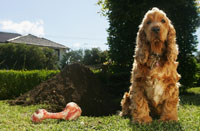Why Do Dogs Bury Bones?
 Burying or hiding bones and other items is a typical dog behavior, like sniffing and tail-wagging. This behavior is instinctual and goes back millions of years. It’s a food-saving technique that all dogs today are born having an instinct for, just as their canine ancestors were. Before being domesticated, this was often a necessary behavior for dogs to ensure that they’d have adequate nutrition at times when food was scarce.
Burying or hiding bones and other items is a typical dog behavior, like sniffing and tail-wagging. This behavior is instinctual and goes back millions of years. It’s a food-saving technique that all dogs today are born having an instinct for, just as their canine ancestors were. Before being domesticated, this was often a necessary behavior for dogs to ensure that they’d have adequate nutrition at times when food was scarce.
Even today, canines in the wild (such as foxes) will kill a small animal, feed on it until only the bones remain, then bury the bones to hide them from other animals looking for food. If their next hunt isn’t successful, they can return to the hiding spot and feed on the leftover bones from the previous hunt. The marrow from bones is rich in nutrients and will usually be sufficient nourishment until the next successful hunting expedition.
You might wonder why dogs may also hide their plastic chew toys, which obviously have no nutritional value. The reason is that, initially, dogs don’t realize that the toy is not food, and their instincts lead them to hide the toy when they're not chewing on it, hoarding it as if it were spare food. A difference between domesticated and wild canines is that domesticated dogs don’t generally retrieve items they’ve hidden or buried, since they are consistently fed and don’t need to return for the hidden item.
So if you are wondering where all the chew toys disappear to, try checking in places your dog might have thought to hide them—such as in between couch cushions or underneath pillows. And if your yard starts to resemble a mine-field, do a little digging of your own for your canine buddy’s food cache before you start thinking you have mole or gopher problems. If you find he’s been hoarding a collection and destroying your yard, you can try not leaving your dog unsupervised with a chew toy or bone. It might be easier to prevent him from acting on his instinctive behavior if you are on hand to distract him.
You May Also Like These Articles:
Why Do Dogs Tilt Their Heads When You Talk?
Does a Dry Nose Mean My Dog is Sick?
Are Dogs Ticklish? Why Do Dogs Kick Their Leg When You Rub or Scratch Them?
How to Prevent Lawn Burn from Dog Urine
Disclaimer: This website is not intended to replace professional consultation, diagnosis, or treatment by a licensed veterinarian. If you require any veterinary related advice, contact your veterinarian promptly. Information at DogHealth.com is exclusively of a general reference nature. Do not disregard veterinary advice or delay treatment as a result of accessing information at this site. Just Answer is an external service not affiliated with DogHealth.com.
Notice: Ask-a-Vet is an affiliated service for those who wish to speak with a veterinary professional about their pet's specific condition. Initially, a bot will ask questions to determine the general nature of your concern. Then, you will be transferred to a human. There is a charge for the service if you choose to connect to a veterinarian. Ask-a-Vet is not manned by the staff or owners of DogHealth.com, and the advice given should not delay or replace a visit to your veterinarian.


